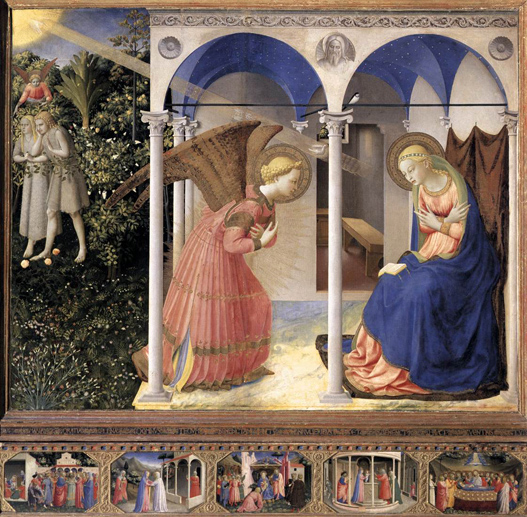I love Christian art. I love it the way I love monasticism, liturgy, and trees. Christian art helps me sense the reality of the depth of the faith I profess. It connects me to the Church throughout time and space. I love that I can say the words "Christian Art" and conjure up images rendered long before the advent of Thomas Kincaid. I love that people have long been using art to wrestle with and build their faith. I love that art can be prayer, worship, scholarship, and contemplation. I love that beauty and creative expression are long established components of Christian worship.
Today I stayed home from church for a solitary sabbath: I slept in, had
pan au chocolat, tea, and strawberries for breakfast. I compared 4 different versions of Psalm 91: in the ESV, the Message, the Book of Common Prayer, and the Louis Segond French translation. I re-read bits of Lauren Winner's
Girl Meets God, read now in the solemn mindfulness of her latest work,
Still. I tried to pray Psalm 91 for a few people I've been feeling worried about, and for myself. I asked for an increase of faith.
"His huge outstretched arms protect you—
under them you're perfectly safe;
his arms fend off all harm."
"Il te couvrira de ses plumes, Et tu trouveras un refuge sous ses ailes."
"He shall defend thee under his wings, and thou shalt be safe under his feathers."
"He will cover you with his pinions,
and under his wings you will find refuge."
My faith is not what it ought to be. I often find it hard to pray. I often don't want to pray, and when I do pray, I find it overwhelming; I want to stop, because there are so many things to pray for.
I went to the Norton Simon, because it's only a 30 minute walk away (I took the bus) and because I imagine myself as a person who goes to art museums all the time. It involved strolling through the water lotus gardens, watching grey-green tadpoles flit and gold-orange dragonflies gleam. It involved the kid's meal: grilled cheese and a fruit salad. It involved sunshine and shady trees and lemon meringue pie. It involved trying to pick up snippets of conversation made by French tourists (
vous connaissez?). It involved an attempt at deep contemplation of Christian art.
After walking the museum over, I returned to a few paintings that especially spoke to me. I realized today that I have an official favorite painting at the Norton Simon. It is "St. Joseph and the Infant Christ", by Giovanni Battista Gaulli. I think I love this painting because it radiates relationship. The whole painting is about the deep love which exists between the Christ-Child and St. Joseph, it's beautiful because St. Joseph manifests such tender love for his adopted son. It's meaningful because it reminds me of the Book of Ruth, of the Book of Revelation, of spiritual adoption, and of God's complete and substantial love for me, his adopted daughter.
But I love this painting in a sort of ironic contrast to the rest of Christian art. I realized that the most important thing about Christian art, about beholding a Christian painting, is being made to see what is not visible.
I spent a long time looking at Francesco Bissolo's "The Annunciation", a painting which depicts Mary receiving the angel Gabriel' s words into her heart, and the Christ-Child into her womb: the birth of our salvation and the Magnificat. It's a warm and lovely painting. I stared at it for a long time before realizing that the most important visible thing in that painting is an Honorable Bird: the Holy-Spirit-as-dove hovering---radiantly and slightly---at the top of the painting. The presence and power of God is often hard to see, it is even invisible sometimes, as was the unborn Christ dwelling within Mary.
This painting struck me because, as I gazed at it, I realized that the Dove of Primal Importance, the Honorable Bird, resides in me. I am the visible element in the painting, imbued with the often intangible presence of God. Wow.
But there is one more painting which today brought me closer to the contemplation of the invisible. It's "Madonna and Child with Book" by Raffaello Sanzio.

This one, while showing the incarnate body of Christ, actually points to the eternal, invisible reality of God. Mary and the Christ-Child sit reading a prayer book. Here is Christ, the one who created Mary and the entire landscape behind them, sitting in his incarnate form, reading about his future death and resurrection. Here is God, the God who always IS, rendered in the past as a child, contemplating his own future acts. At the time of the painting, all the work of redemption had been accomplished--Christ was seated on the throne in heaven, interceding for us: it is a meditation piece concerned with the constant presence, the constant being, of God. It is eternity past, present, and future all in one. Here is Mary, teaching her son about his own nature, as he sits in her arms, the arms that he himself created as the "Firstborn of all creation". God very God, here with us as creator, redeemer, and word. Here is the description given with the painting:
"The inscription in the book introduces the ninth hour, or Nones of the
Canonical Offices, recited daily by all monastic communities. The Nones
commemorates Christ's Crucifixion and Death. With eyes turned to
heaven, the Christ Child contemplates His own sacrifice as man's
Redeemer."
I need to see Christian art. I need to present my eyes with things that invite them to believe and worship: it's so good for my soul. So today church was held in an airy museum, and the Eucharist was a slice of lemon meringue pie, imbibed under the acrylic gazes of penitents St. Francis and St. Jerome.







